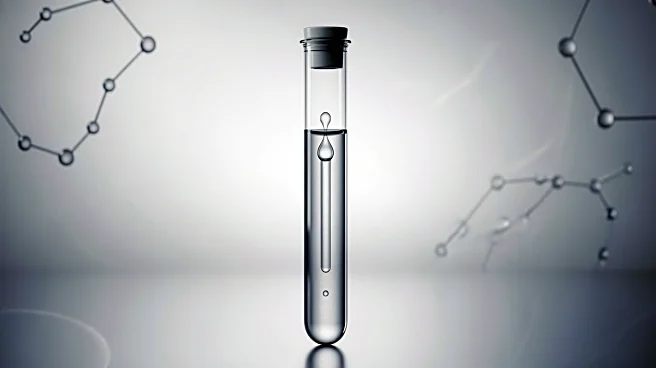What's Happening?
Researchers from the University of São Paulo and Embrapa Instrumentação have developed a low-cost, portable biosensor capable of detecting brain-derived neurotrophic factor (BDNF) levels in saliva. This protein is linked to mental health conditions such
as depression, schizophrenia, and bipolar disorder. The device, which costs approximately $2.19 per unit, provides results in under three minutes, offering a fast, affordable, and noninvasive diagnostic tool. The biosensor consists of a flexible strip with electrodes that analyze a drop of saliva, potentially transforming mental health screening, especially in low-resource settings. The research, published in ACS Polymers Au, highlights the device's ability to measure extremely low concentrations of BDNF, which is crucial for neuron health and brain function.
Why It's Important?
The development of this biosensor is significant as it offers a cost-effective and rapid method for diagnosing mental health disorders, which are prevalent worldwide. According to the World Health Organization, over 1 billion people suffer from mental disorders, with anxiety and depression being the most common. Early detection and monitoring of these conditions are crucial for effective treatment and management. The biosensor's affordability and ease of use make it accessible for widespread use, particularly in areas with limited healthcare resources. This innovation could lead to improved mental health outcomes by enabling timely intervention and personalized treatment plans.
What's Next?
The next steps for the researchers include obtaining a patent for the biosensor and potentially commercializing the device. This could lead to broader availability and use in clinical settings, enhancing the ability to diagnose and monitor mental health conditions. The researchers also aim to optimize the biosensor for different profiles, moving towards personalized medicine. As the device becomes more widely used, it may prompt further research and development in the field of mental health diagnostics, potentially leading to new insights and treatment approaches.
Beyond the Headlines
The introduction of this biosensor could have broader implications for the healthcare industry, particularly in the realm of personalized medicine. By providing a noninvasive and rapid diagnostic tool, the biosensor aligns with the trend towards more individualized healthcare solutions. Additionally, the device's low cost and ease of use could democratize access to mental health diagnostics, reducing disparities in healthcare access. This development also raises questions about the integration of such technologies into existing healthcare systems and the potential need for new regulatory frameworks to ensure their safe and effective use.
















